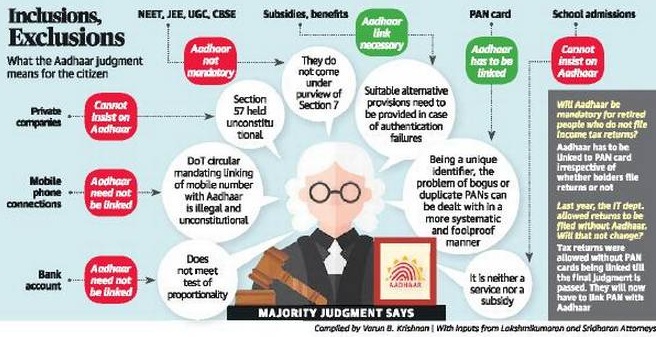
Aadhaar is Constitutional
Why it is in news?
- The Supreme Court in a majority opinion upheld Aadhaar as a reasonable restriction on individual privacy
- Aadhar fulfils the government’s “legitimate aim” to provide dignity to a large, marginalised population living in abject poverty.
- “The Constitution does not exist for a few or minority of the people of India, but ‘We the People’,” the Supreme Court observed.
- An “unparalleled” identity proof.
- A document that cannot be duplicated unlike PAN, ration card, and passport.
Dissent judgement
- Justice D.Y. Chandrachud wrote a sharp dissent, declaring Aadhaar unconstitutional.

Where aadhar is constitutional?
- Justice Sikri said technology had become a vital tool for ensuring good governance in a social welfare state.
- Schemes like PDS, scholarships, mid-day meals, LPG subsidies, involve a huge amount of money and “fool-proof” Aadhaar helped welfare reach the poor.
- Upholding the passage of the Aadhaar Act as a Money Bill, the Supreme Court said neither were individuals profiled nor their movements traced when Aadhaar was used to avail government benefits under Section 7 of the Aadhaar Act of 2016.
- The statute only sought “minimal” biometric information, and this did not amount to invasion of privacy.
Bar on bank-mobile link
- The majority opinion upheld the PAN-Aadhaar linkage, but declared linking Aadhaar with bank accounts and mobile SIM cards unconstitutional.
- The court insulated children from the Aadhaar regime.
- The card was not necessary for children aged between six and 14 under the Sarva Shiksha Abhiyan as right to education was a fundamental right.
- Statutory bodies like CBSE and UGC cannot ask students to produce their Aadhaar cards for examinations like NEET and JEE.
- Permission of parents and guardians was a must before enrolling children into Aadhaar, the Supreme Court declared.
- Children once they attained the age of majority could opt out of Aadhaar, the Supreme Court said.
- It said it was not trivialising the problem of exclusion faced by the elderly, the very young, the disabled and several others during the authentication process.
- Authentication was found to be only having a .232% failure, Justice Sikri pointed out. It was accurate 99.76% times, Justice Sikri said.
Source
The Hindu

